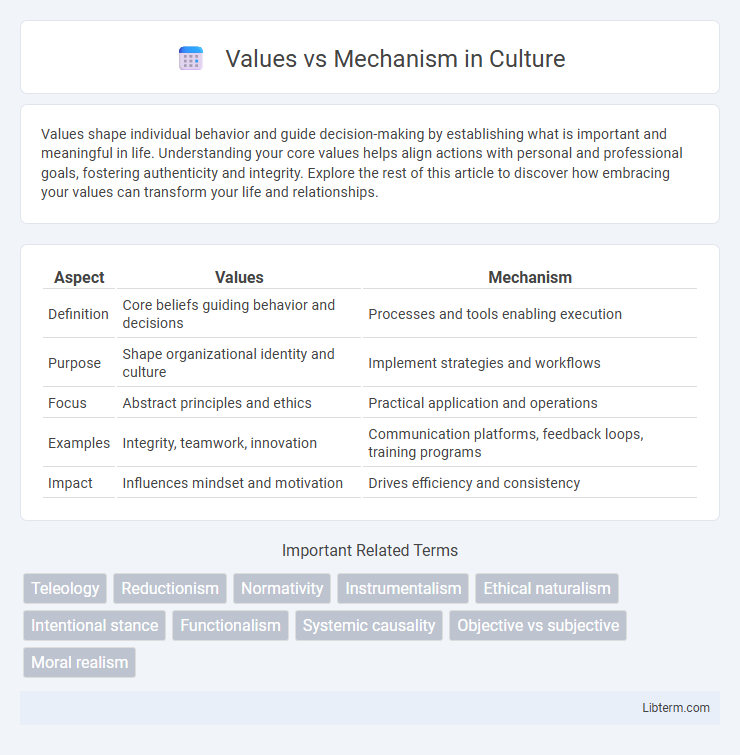Values shape individual behavior and guide decision-making by establishing what is important and meaningful in life. Understanding your core values helps align actions with personal and professional goals, fostering authenticity and integrity. Explore the rest of this article to discover how embracing your values can transform your life and relationships.
Table of Comparison
| Aspect | Values | Mechanism |
|---|---|---|
| Definition | Core beliefs guiding behavior and decisions | Processes and tools enabling execution |
| Purpose | Shape organizational identity and culture | Implement strategies and workflows |
| Focus | Abstract principles and ethics | Practical application and operations |
| Examples | Integrity, teamwork, innovation | Communication platforms, feedback loops, training programs |
| Impact | Influences mindset and motivation | Drives efficiency and consistency |
Introduction to Values and Mechanism
Values represent fundamental beliefs and principles that guide behavior and decision-making within individuals or organizations, emphasizing what is considered important and desirable. Mechanisms are structured processes or tools designed to implement and reinforce these values effectively in practical scenarios. Understanding the relationship between values and mechanisms is crucial for aligning organizational culture with strategic goals and ensuring consistent ethical conduct.
Defining Values: Core Principles
Core principles define values as fundamental beliefs guiding behavior and decision-making within organizations or individuals. These intrinsic values establish a framework that shapes culture, ethics, and priorities, ensuring consistent actions aligned with foundational ideals. Unlike mechanisms, which are processes or tools, core principles represent enduring commitments that influence long-term purpose and identity.
Understanding Mechanism: How Things Work
Understanding mechanisms involves analyzing the processes and structures that drive how systems function, revealing the cause-and-effect relationships underlying outcomes. This focus on operational details enables accurate predictions and targeted improvements in technology, biology, or social systems. Emphasizing mechanisms provides clarity on the practical implementation and dynamic interactions essential for optimizing performance and innovation.
Historical Perspectives on Values and Mechanism
Historical perspectives on values emphasize deeply ingrained beliefs shaping societal norms, while mechanisms refer to the structured processes enabling value transmission and societal function. Ancient civilizations embedded values in rituals and laws, creating mechanisms such as governance systems to enforce those values. Over time, evolving institutions adapted mechanisms like codified legal frameworks and educational systems to reflect changing values across cultures and eras.
The Interplay between Values and Mechanism
The interplay between values and mechanisms shapes organizational effectiveness by aligning core principles with operational processes. Values provide a foundational ethical framework guiding decision-making, while mechanisms translate these values into actionable policies and practices. This synergy ensures consistency, enhances trust, and drives sustainable performance across all levels of an organization.
Practical Examples: Values vs Mechanism
Values define the core principles guiding behavior, such as honesty or sustainability, while mechanisms are the specific processes or tools used to implement these values, like transparent reporting systems or recycling programs. For example, a company's value of transparency is realized through mechanisms like open financial disclosures and regular stakeholder meetings. Similarly, a community prioritizing safety establishes mechanisms such as neighborhood watch programs and improved street lighting to uphold that value.
Influence on Decision Making
Values serve as the fundamental principles guiding an individual's or organization's priorities, shaping their preferences and defining what is considered important in decision making. Mechanisms, including processes, tools, and frameworks, facilitate the practical application of these values by structuring how decisions are evaluated and executed. The alignment between underlying values and chosen mechanisms critically influences the consistency, transparency, and effectiveness of decision outcomes.
Impact on Organizational Culture
Values shape organizational culture by defining core beliefs and guiding principles that influence employee behavior and decision-making. Mechanisms, such as policies, rituals, and communication channels, operationalize these values to ensure consistent alignment across all levels of the organization. The interplay between values and mechanisms creates a strong culture that drives engagement, accountability, and long-term organizational success.
Challenges in Balancing Values and Mechanism
Balancing values and mechanisms presents challenges such as aligning organizational culture with procedural frameworks without compromising ethical standards or operational efficiency. Conflicts often arise when rigid mechanisms stifle innovation or fail to reflect core values, leading to resistance and reduced employee engagement. Ensuring mechanisms are adaptable and reflective of evolving values requires continuous assessment and strategic realignment to maintain both integrity and functionality.
Future Trends and Conclusion
Future trends indicate a growing emphasis on aligning organizational mechanisms with core values to drive sustainable innovation and ethical decision-making. Emerging technologies like AI and blockchain enhance transparency and accountability, reinforcing value-driven cultures in dynamic markets. Companies prioritizing value-mechanism integration outperform competitors by fostering trust, agility, and long-term growth.
Values Infographic

 libterm.com
libterm.com